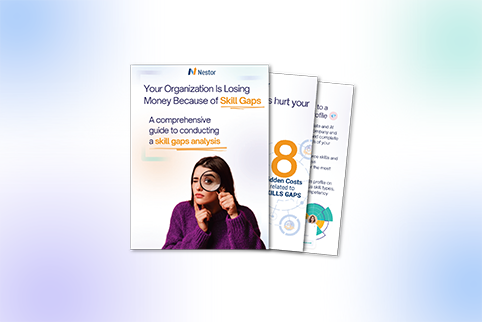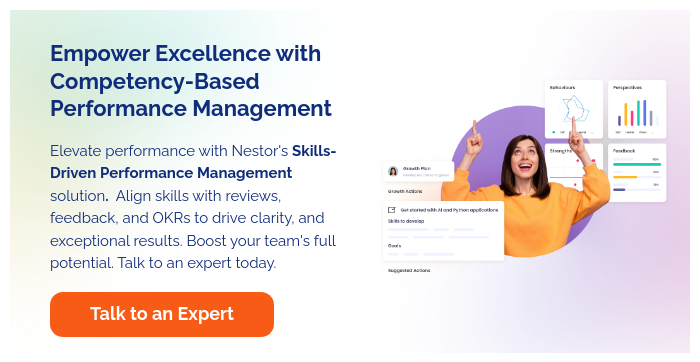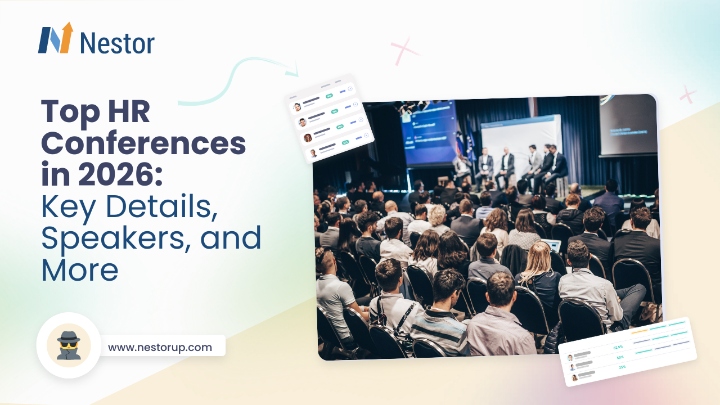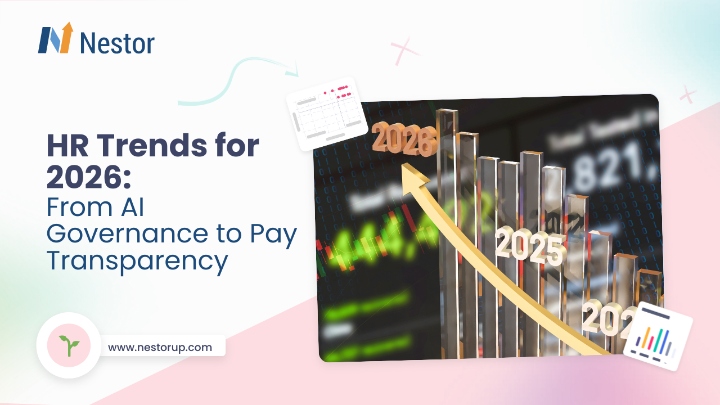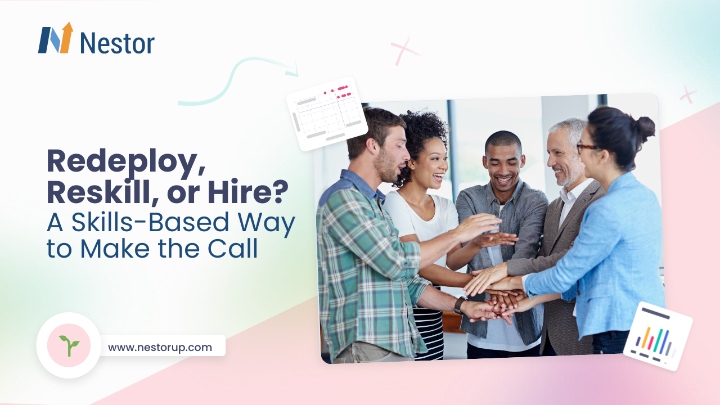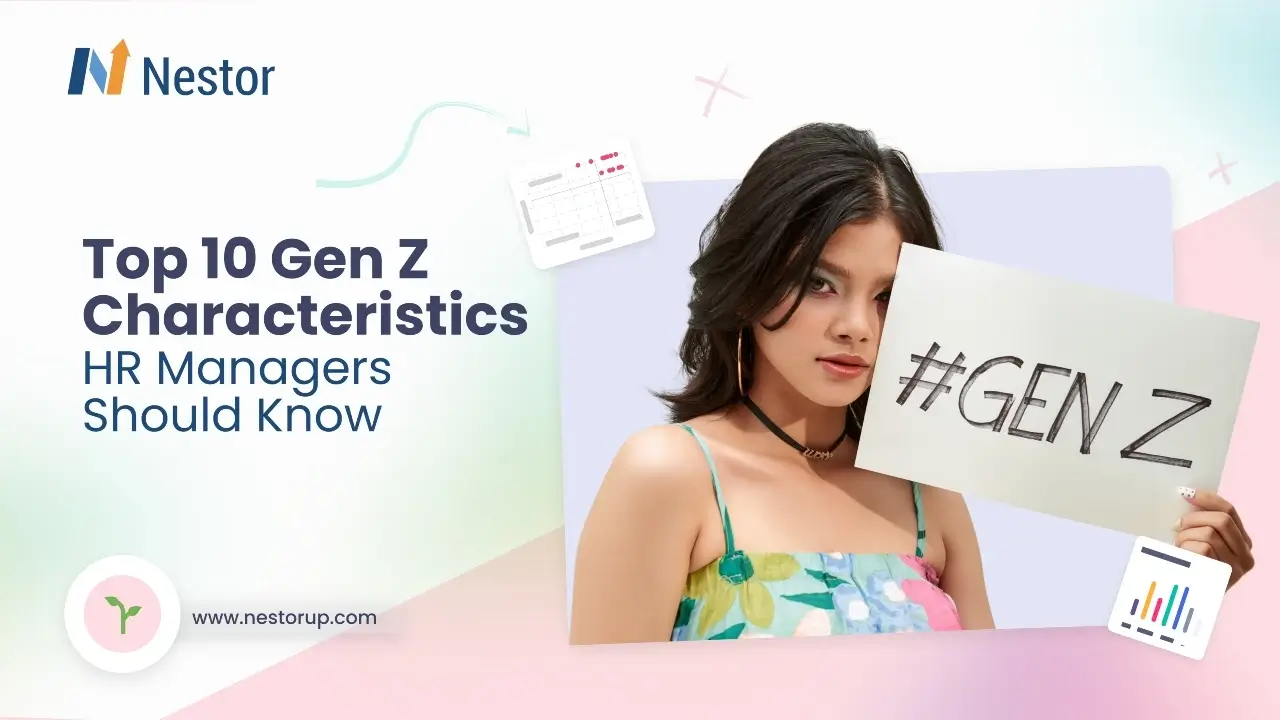
Contents
Gen Z is already in the building. You’ve probably onboarded them, managed them, or maybe tried to figure out why their camera’s always off on Zoom. Over 50 million are working in the U.S. right now, and another 17 million joined the workforce last year. That’s not a slow drip. It’s a flood. So let’s talk about Gen Z characteristics.
The big picture is fuzzy. Global numbers haven’t caught up, and most research is still working with forecasts. McKinsey says Gen Z might make up 30% of the world’s workforce by 2030. Whether or not that proves exact, one thing’s clear: this generation is shaping how work feels, looks, and functions.
Silvia Enache, Head of Human Resources at Bringo has been watching this shift happen in real time: “A new age is taking shape, an interesting one to take part in, as a fresh generation starts to be more and more present in the workplace, Gen Z.”
Citing some Stanford-affiliated research, Silvia Enache describes a typical Gen Zer as “a self-driver who cares about others and is highly collaborative and social, appreciates authenticity, relevance, and non-hierarchical leadership.“
Aspects that surface when working with Gen Zers are very much grounded in their pragmatic approach, their interest in getting things done and their affinity for the latest technology.
— Silvia Enache, Head of Human Resources at Bringo
What does that mean for the rest of us? It means some of the old instincts—managing by authority, rewarding face time, clinging to hierarchy—might not land the way they used to.
Starting with these definitions, let’s explore the key traits and gen Z characteristics that define this generation and their potential impact in the workplace. Our aim is to clarify what makes Gen Zers tick and how businesses can use that to nurture a talented workforce and sustainable growth.
Let’s dive right in!
1. Gen Z Are Digital Natives
The first on our list of Gen Z characteristics is their status as the first fully digital native generation.
Gen Z grew up with the internet in their pocket. They have had access to innovative technologies from an early age and are used to things being immediately accessible: information, entertainment, goods and services, etc. And no, this isn’t just a fun fact. It’s a lens through which they see everything. It shapes how they learn, communicate, make decisions, and work. That’s why digital fluency isn’t just a skill for Gen Z; it’s their default mode.
Unlike previous generations who had to adapt to tech, Gen Z was raised by it. They’re comfortable jumping between platforms, apps, devices, and workflows without skipping a beat. They expect things to be fast, intuitive, and accessible. If it takes too many clicks or explanations, they’re already thinking, “There has to be a better way.”
This mindset shows up clearly in the workplace. As one of the Gen Z characteristics, they are eager to work with tools that make their jobs easier. Not just because it’s cool, but because it’s efficient. They don’t see tech as a bonus. They see it as the bare minimum. If a system feels outdated or unnecessarily manual, they’ll either question it, or quietly build their own workaround.
The same goes for how they learn. Traditional training sessions? Not their thing. They grew up with YouTube tutorials, Reddit threads, and online communities where knowledge is shared freely and constantly updated. That’s why they tend to favor self-paced, on-demand learning. They also respond better to coaching and mentoring initiatives, thanks to them being used to influencers, their early online ‘mentors’.
For employers, this means one thing: if you want Gen Z to thrive in your team, give them the tools and autonomy to run with it. Keep your systems clean, your tech stack current, and your L&D flexible. They’ll take it from there.
2. Radically Inclusive & Identity-Driven Workforce
Another one of the defining gen Z characteristics, is their radical inclusivity and tendency to prioritize individual identity, which is expressed through the things they do, watch, or buy. This generation has grown up in an era where identity is fluid, and where individual expression is celebrated, not boxed in.
Gen Zers are not fans of stereotypes and are more open to accepting different opinions or life choices. They reject the idea that people have to fit into predefined molds. Whether it’s the way they dress, the music they listen to, or the causes they support, Gen Z is deeply invested in expressing who they truly are, without apology.
And when it comes to work? It’s no different. Gen Z expects employers to walk the talk when it comes to inclusivity. They want to see real efforts to create diverse environments where different perspectives aren’t just accepted but celebrated. In fact, this generation isn’t afraid to call out employers who say one thing but do another. They’re looking for organizations that actually put in the work to create a space where everyone can be themselves.
What does all of this mean for businesses?
To attract top Gen Z talent, you need to create a truly inclusive and diverse workplace, where everyone is encouraged to be themselves and celebrate their uniqueness while also being part of a supportive community.
Gen Zers thrive in environments where they’re free to explore their unique identities, whether through personal projects, flexible roles, or tailored career paths. They want to see companies supporting dynamic career paths and personalized growth opportunities that reflect their own evolving aspirations.
3. Gen Z Are Highly Analytical and Pragmatic
Third on our list of Gen Z characteristics is their analytical and pragmatic nature.
So, let’s start this by debunking a myth: Gen Z is often pegged as the “lazy” generation, but in reality, they’re anything but. Gen Z is pragmatic and laser-focused on efficiency, problem-solving, and getting things done. This generation values results over effort for effort’s sake. If something doesn’t make sense or add value, they’ll ask, “Why are we doing it this way?”
Where they differ most from their Millennial counterparts is in their approach to problem-solving. Gen Zers are less idealistic and more practical. They look for solutions that work right now, not five years from now. They’re not stuck dreaming about grand, abstract visions of the future. They’re grounded in the here and now, figuring out how to do things better, faster, and more efficiently.
This approach is rooted in their digital upbringing. Gen Z doesn’t have the patience for excessive planning or drawn-out decision-making processes. They want to test, iterate, and improve.
You’ll see this in their willingness to experiment with new tools, explore unconventional solutions, or try multiple ways to solve a problem until they find what clicks. They rely heavily on their digital skills, from data analysis to software exploration, to get to the most effective outcome.
And when it comes to learning, Gen Z is all about finding the most efficient path to growth. They don’t need hours of lectures or endless paperwork. Instead, they prefer bite-sized, actionable learning moments. They’ll watch a YouTube video to troubleshoot an issue or attend a webinar that gets straight to the point.
Despite what some might say about their “impatience,” this drive for quick, tangible results often translates to an impressive work ethic. However, there’s a catch. Silvia Enache from Bringo highlights that while Gen Z’s pragmatism and efficiency are strengths, they can sometimes be misinterpreted as detachment.
They have a reputation amongst the people from the other generations that they are impatient, tending to treat things lightly with too much detachment. That is why communication is key to deeply understanding what the drivers of each generation are and how to work around the different approaches that they have, to jointly reach objectives.
— Silvia Enache, Head of Human Resources at Bringo
4. Expecting Transparency in the Workplace
If there’s one thing Gen Z demands from employers, it’s transparency. This is directly related to their appreciation for authenticity, which also translates into their need for clear instructions and well-defined expectations regarding their job roles and duties.
As Silvia Enache puts it, “Even more than millennials, The Zoomers (as they are also called), look to their employers for stability and transparency in several ways. From pay and benefits to purpose and meaning of work done, managerial style and flexibility just to name a few.” In other words, Gen Z wants to know exactly where they stand, and where you stand, too.
This drive for transparency is also linked to their preference for genuine relationships. Whether it’s in their personal life or at work, Gen Z wants to form bonds built on trust. They want open communication, and they’re more than willing to share what they need, as long as they know you’re doing the same.
Interestingly enough, and contrary to popular belief, studies have shown that Gen Zers actually prefer in-person communication over digital exchanges. There’s a sense of connection and sincerity they get from being in the same room or even on a video call with someone. So, if your company’s fully remote, it might be worth finding ways to create more in-person opportunities for your team to build trust and align on expectations.
Maybe what is most important is the fact that all generations, Gen Z in particular, expect the leaders to be emotionally intelligent showing a high dose of respect for the employees, while fostering trust and advocating for their needs.
— Silvia Enache, Head of Human Resources at Bringo
5. Gen Z Value Autonomy and Flexibility
Fifth on our list of Gen Z characteristics is the combination of autonomy and flexibility, which is also related to their tendency to be more self-reliant and confident in their abilities to handle tasks. They want the freedom to do things their way, whether that means working from home, at a café, or traveling. They don’t need someone looking over their shoulder as long as they have clear goals and the tools to get things done.
This is a generation that’s grown up with the ability to customize their experiences; from choosing what content they watch to how and when they work. They expect that same level of control in the workplace. For Gen Z, the “how” of getting things done is just as important as the “what.”
They want the freedom to choose when and where they work, as long as the results are up to standard. This makes them perfect for remote-first companies or those with flexible schedules. In fact, we’re seeing a growing number of Gen Z employees taking the plunge into digital nomadism, seeking the freedom to travel and work from anywhere on their own terms.
This desire for flexibility also ties into their dislike of rigid hierarchies. Gen Zers don’t do well in authoritarian, micromanaged environments and prefer non-hierarchical leadership and structures. They prefer flat organizational structures where input can come from anywhere, not just the person at the top. They don’t need to climb a ladder to be heard and want the freedom to contribute and be part of a team where their ideas matter.
For businesses, this is an opportunity to rethink how they structure teams and manage performance. A results-focused approach, with a mix of remote work options and flexible schedules, is exactly what Gen Z needs to thrive. But it requires trust. The old mindset of micromanaging just doesn’t work with this generation.
6. Love for Both Collaboration and Competition
On one hand, Gen Z have been raised in education systems and environments with a high focus on competition and rewarding top performers. From grades to social media followers, they’ve always been encouraged to compete, improve, and rise to the top. As a result, they’ve developed a strong drive to challenge themselves and grow their skill set, constantly striving for personal achievements and career milestones.
On the other hand, they are very social and collaborative, embracing the power of groups and communities, which means they want and like to solve problems together with peers and other like-minded people. They see collaboration as an opportunity to learn from others, exchange ideas, and build on each other’s strengths.
This ability to both compete and cooperate is one of Gen Z’s standout characteristics. In the workplace, this means they’re looking for an environment that fosters both individual achievement and teamwork. They want to be recognized for their personal contributions but also value the success of the team as a whole.
For employers, this means creating a balance. On one hand, encourage healthy competition: set clear goals, reward top performers, and provide opportunities for individual growth. On the other hand, build a culture where teamwork is celebrated and collaborative problem-solving is part of the norm.
7. Gen Z Prioritize Work-Life Balance and Stability
Seventh on our list of Gen Z characteristics is their deep desire for balance, stability, and security.
Gen Zers saw their parents struggle through the Great Recession and have grown up in a world that hasn’t really felt safe. This makes them prioritize a stable income, savings, and financial security. In the workplace, it translates into a strong expectation to be paid fairly and receive regular salary increases.
But they also want more than just a paycheck. Their work needs to fit into a balanced life. They want enough time outside of work for hobbies, relationships, and self-care. A successful career, to them, is one that doesn’t consume every waking hour but allows them the space to thrive in other areas of their lives too.
In terms of mental and emotional well-being, they’re hyper-aware of the toll that stress and burnout can take. Having grown up in a world where mental health issues are more openly discussed, Gen Z is far more proactive about maintaining their well-being. They want a work environment that supports their mental health and offers resources to help them manage stress.
In the end, Gen Z wants to succeed, but they aren’t willing to sacrifice their lives for it. They expect companies to respect their time, recognize the importance of well-being, and offer a job that enables them to lead a balanced, fulfilling life.
8. Gen Z Have a Desire for Meaningful Work
Gen Zers’ longing for meaning and fulfillment is also present in their work-related priorities and choices. They are more likely to join companies where they don’t feel like another cog in the corporate machine, companies they can actually relate to, and environments where their work makes a real difference.
An important aspect in this direction is the respect received from their peers and managers as well as the importance of being seen for who they really are, as their true self, not just as another employee or a number on an Excel sheet.
They value authenticity and expect their workplace to reflect this. This means that if a company’s values don’t align with their own, they’ll move on without hesitation. Gen Z is loyal to companies that share their vision and are actively working toward creating positive change in the world.
Another characteristic is their strong sense of (social) justice. Gen Z is a generation that cares deeply about issues like climate change, equality, and social justice. They’re more likely to support companies that take a stand on these issues and are actively working to create change. That’s because they want to feel proud of their workplace and want an employer whose values align with their own.
Gen Z are known for the fact that they value inclusive environments, autonomy, flexibility and feeling proud to work for the employer they chose. They strive for meaningful work and want to represent a company that is viewed in a positive light by their peers.
— Silvia Enache, Head of HR at Bringo
9. Gen Z Are Eager for Growth and Development Opportunities
Ninth on our list of Gen Z characteristics is their deep desire to grow, develop, and progress in their careers. This is a generation that doesn’t want to wait for opportunities to come to them; they want to grab them by the horns and make things happen. This also makes them less patient overall and have an increased expectation of being promoted faster (than other generations) or even multiple times a year.
They’re not interested in waiting around for years to move up the ladder. Instead, they want to know exactly how they can advance, and they expect their employers to provide clear and frequent feedback. If they feel that their current company isn’t offering enough growth potential, they won’t hesitate to move on. This phenomenon—job hopping—is common among Gen Zers, who are always looking for the best opportunities to grow and achieve their long-term goals.
One of the reasons behind this is the fact that the world in which they’ve lived and grown up has been defined by fast-paced developments and shifts, especially (but not only) in the realm of technology.
They pay close attention to what organizations have to offer in terms of personal development plans, budgets, and career pathing. If your company offers mentorship programs, leadership training, and a clear trajectory for career progression, you’ll likely find Gen Z to be loyal, motivated, and eager to stay. If not, they’ll be on the lookout for an employer that meets their growth expectations.
10. Entrepreneurial Mindset and Ambition
And last but not least is their entrepreneurial or can-do attitude. Unlike previous generations, they’ve grown up with access to powerful digital tools that allow them to launch businesses, brands, or side hustles from their bedrooms.
Many Gen Zers are already running online stores, building their own social media brands, or pursuing creative ventures in their spare time. The idea of “working for the man” just doesn’t have the same appeal for them as it did for older generations.
This entrepreneurial spirit is fueled by the rise of influencers, digital creators, and self-made online entrepreneurs who have become role models for Gen Z. They see how much can be achieved with the right digital tools and a strong online presence, and they’re eager to follow in those footsteps.
Many Gen Zers are already participating in the gig economy, taking on freelance work or managing side projects that provide additional streams of income.
For employers, this entrepreneurial mindset can be a blessing in disguise. Employers can take advantage of this entrepreneurial mindset by preparing talented individuals to become the leaders of tomorrow and listening to their perspectives to identify novel solutions to current business challenges.
Employers who encourage autonomy, support creative problem-solving, and foster an environment where innovation is celebrated will find that Gen Z employees can be some of the most motivated and forward-thinking members of their teams.
Final Thoughts on Gen Z Characteristics
This generation has different values, different expectations, and a different way of working. They prioritize transparency, flexibility, and meaningful work.
They want to learn and grow quickly, and they expect to be seen and heard. HR professionals and managers who get this will be ahead of the game, attracting the best talent and keeping them engaged for the long run.
In the end, Gen Z isn’t just the future of work; they’re the now. And those who can tap into their drive, their ideas, and their passion for change will be the ones who shape the future. So, the question isn’t whether you can adapt to Gen Z. The real question is, are you ready to embrace what they have to offer?



